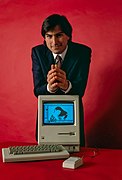The Internet PortalThe Internet (or internet) is the global system of interconnected computer networks that uses the Internet protocol suite (TCP/IP) to communicate between networks and devices. It is a network of networks that consists of private, public, academic, business, and government networks of local to global scope, linked by a broad array of electronic, wireless, and optical networking technologies. The Internet carries a vast range of information resources and services, such as the interlinked hypertext documents and applications of the World Wide Web (WWW), electronic mail, telephony, and file sharing. The origins of the Internet date back to research that enabled the time-sharing of computer resources and the development of packet switching in the 1960s. The set of rules (communication protocols) to enable internetworking on the Internet arose from research and development commissioned in the 1970s by the Defense Advanced Research Projects Agency (DARPA) of the United States Department of Defense in collaboration with universities and researchers across the United States and in the United Kingdom and France. The ARPANET initially served as a backbone for the interconnection of regional academic and military networks in the United States to enable resource sharing. The funding of the National Science Foundation Network as a new backbone in the 1980s, as well as private funding for other commercial extensions, encouraged worldwide participation in the development of new networking technologies and the merger of many networks using DARPA's Internet protocol suite. The linking of commercial networks and enterprises by the early 1990s, as well as the advent of the World Wide Web, marked the beginning of the transition to the modern Internet, and generated sustained exponential growth as generations of institutional, personal, and mobile computers were connected to the network. Although the Internet was widely used by academia in the 1980s, the subsequent commercialization in the 1990s and beyond incorporated its services and technologies into virtually every aspect of modern life. (Full article...) Selected articleDelrina was a Canadian software company based in Toronto, that existed between 1988 and 1995, prior to being bought by the American software firm Symantec. Delrina started out by producing a set of electronic form products known as PerForm and later, FormFlow. However, the company was best known for its WinFax software package of the early- to mid-1990s, which enabled computers equipped with fax-modems to communicate faxes to stand-alone fax machines or other similarly-equipped computers. Delrina also produced a set of popular screensavers, including one that resulted in the well-publicized "flying toasters" lawsuit for copyright and trademark infringement (Berkeley Systems Inc. v. Delrina); the case set a precedent in American law that satiric commercial software products were not subject to the same First Amendment exemptions as parodic cartoons or literature. After the buyout by Symantec in 1995, parts of the firm were sold off, while Symantec continues to sell the WinFax product to this day. In its wake, several of Delrina's former executives founded venture capital firms that continue to have a lasting impact on the Canadian software industry. Selected picture In computer networking, a wireless access point (WAP or AP) is a device that connects wireless communication devices together to form a wireless network. The WAP usually connects to a wired network, and can relay data between wireless devices and wired devices. Several WAPs can link together to form a larger network that allows "roaming". News
Wikinews Internet portal
WikiProjects
Did you know (auto-generated) -
Selected biography
Joseph Carl Robnett Licklider (March 11, 1915 – June 26, 1990), known simply as J.C.R. or "Lick" was an American computer scientist, considered one of the most important figures in computer science and general computing history. After early work in psychoacoustics, he became interested in information technology early in his career. Much like Vannevar Bush, J.C.R. Licklider's contribution to the development of the Internet consists of ideas, not inventions. He foresaw the need for networked computers with easy user interfaces. His ideas foretold of graphical computing, point-and-click interfaces, digital libraries, e-commerce, online banking, and software that would exist on a network and migrate wherever it was needed. Licklider was instrumental in conceiving, funding and managing the research that led to modern personal computers and the Internet. His seminal paper on Man-Computer Symbiosis foreshadowed interactive computing, and he went on to fund early efforts in time-sharing and application development, most notably the work of Douglas Engelbart, who founded the Augmentation Research Center at Stanford Research Institute and created the famous On-Line System. He played a similar role in conceiving of and funding early networking research, most notably the ARPAnet.
General images -The following are images from various internet-related articles on Wikipedia.
Selected quoteMore Did you know...
Main topics
Featured contentCategoriesRelated portalsThings you can do
Associated WikimediaThe following Wikimedia Foundation sister projects provide more on this subject:
Wikipedia's portalsDiscover Wikipedia using portals |
How Can We Help?























































Recent Comments